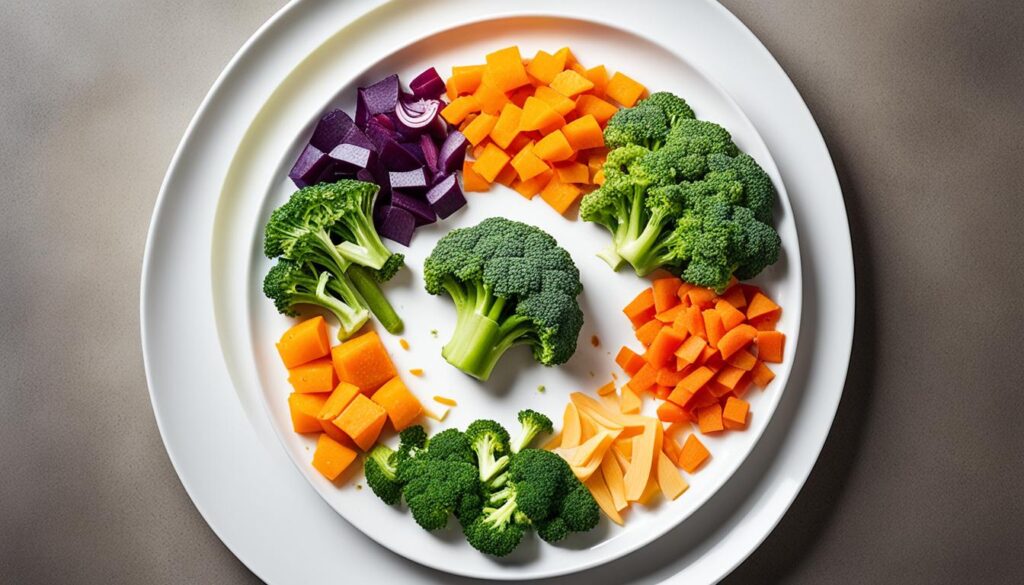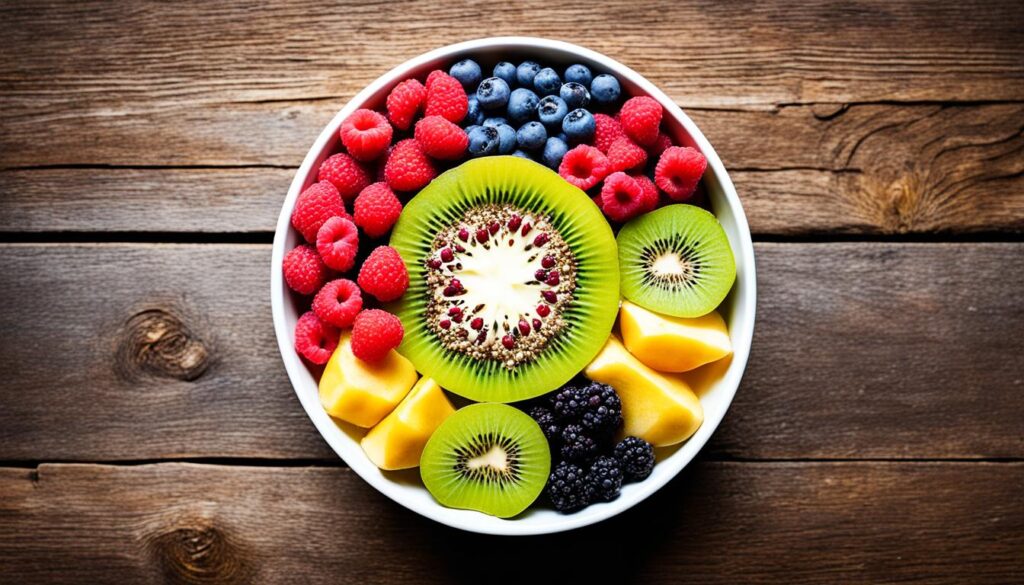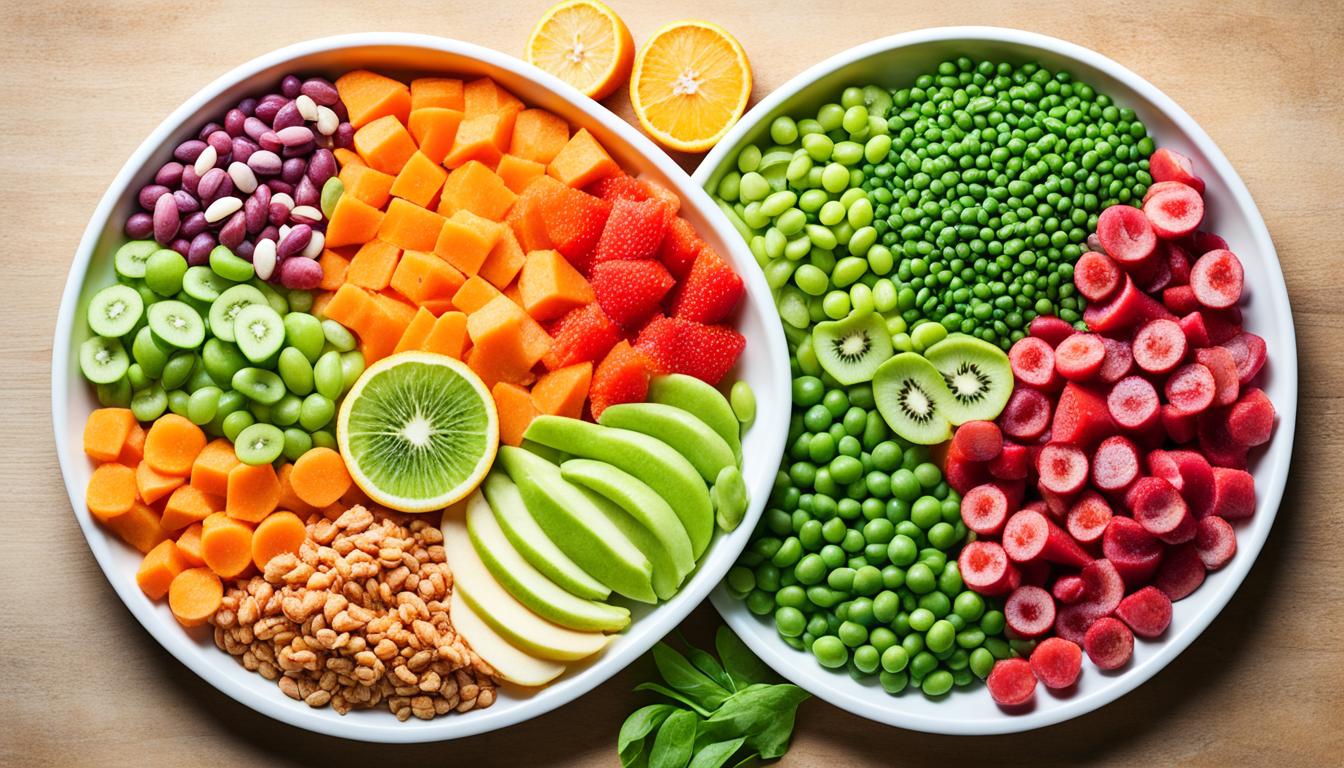Keeping your digestive system healthy is key to overall health. You can do this by eating foods rich in water soluble fiber. This type of fiber comes from plants and it’s good at adding bulk to your stools. It also feeds the good bacteria in your gut.
Soluble fiber helps by drawing water into your gut. This makes stools softer and aids in keeping your bowel movements regular. Including foods like psyllium husk, oats, beans, apples, citrus fruits, barley, flaxseeds, carrots, and brussels sprouts in your diet can help a lot. It can improve your digestion, lessen constipation, and might even lower your cholesterol and blood sugar.
To stay full longer and cut down on snacking, eat a mix of these foods every day. They’re not only good for regular bowel movements. They also help your gut stay healthy, which is important for digesting food and taking in nutrients.
So, by adding plenty of different fiber sources to what you eat, you’re looking after your gut. This can mean a happier, healthier digestive system.
Key Takeaways
- Soluble fiber attracts water into the gut, softening stools and promoting regular bowel movements.
- Foods rich in soluble fiber include psyllium husk, oats, beans, apples, citrus fruits, barley, flaxseeds, carrots, and brussels sprouts.
- Consuming water soluble fiber foods can help reduce constipation and potentially lower cholesterol and blood sugar levels.
- Incorporating a variety of soluble fiber sources into your diet supports digestive health, weight management, and a thriving gut microbiome.
- Making conscious choices to include fiber-rich foods in your daily meals and snacks promotes optimal digestion and overall well-being.
What is Water Soluble Fiber and Why is it Important?
Dietary fiber is key for a healthy diet. It helps with digestion and boosts overall health. There are two types of fiber: soluble and insoluble. Knowing the difference helps when choosing what to eat.
Understanding Soluble and Insoluble Fiber
Soluble fiber dissolves in water, creating a gel in the stomach. This slows digestion, allowing more nutrient absorption. It also makes you feel full. Foods like oats, beans, apples, and carrots are good sources.
Insoluble fiber, on the other hand, does not dissolve in water. It goes through the body mostly unchanged. This fiber type adds bulk to stool. It helps with regular bowel movements and prevents constipation. Whole grains, nuts, and fruit and veggie skins are rich in insoluble fiber.
Health Benefits of Soluble Fiber
Soluble fiber has many health benefits. It can improve digestion, lower blood cholesterol, and help control blood sugar. Also, it aids in managing weight by making you feel full longer.
To get these benefits, add various fiber-rich foods to your diet. Below, you’ll find great sources of soluble fiber:
| Food | Soluble Fiber Content (per serving) |
|---|---|
| Oats (1 cup, cooked) | 4 grams |
| Black beans (1/2 cup, cooked) | 2.4 grams |
| Brussels sprouts (1/2 cup, cooked) | 2 grams |
| Avocado (1/2 medium) | 2 grams |
| Apple (1 medium) | 1.4 grams |
Eating a variety of soluble fiber foods supports your gut and heart. It keeps your blood sugar in check. Remember, include both soluble and insoluble fiber for good health.
Beans: A Nutritional Powerhouse Rich in Soluble Fiber
Beans are a big deal when it comes to soluble fiber. These plants are full of needed nutrients like protein and iron. Eating different types of beans is great for your gut, helps keep blood sugar steady, and makes you feel full.
Black Beans
Black beans enhance any dish with their taste and health benefits. They have pectin, which turns into a gel in water. This gel slows down how fast your stomach empties, keeping you full and helping you absorb nutrients. Besides this, black beans are a good source of protein and iron, and they’re low in calories and fat.
Lima Beans
Also known as butter beans, lima beans are large and flat. They offer carbs, protein, and a bit of fat. Like other beans, lima beans have pectin. This soluble fiber maintains your blood sugar and keeps you feeling satiated.
Kidney Beans
Kidney beans shine in dishes like chili. These beans are packed with fiber, carbs, and protein. They are low in fat and contain some calcium and iron. Their soluble fiber is awesome for blood sugar control and digestion.
| Bean Type | Soluble Fiber (per 1 cup cooked) | Protein (per 1 cup cooked) | Iron (per 1 cup cooked) |
|---|---|---|---|
| Black Beans | 5.4 grams | 15.2 grams | 3.6 mg |
| Lima Beans | 6.6 grams | 11.6 grams | 4.5 mg |
| Kidney Beans | 5.7 grams | 15.3 grams | 5.2 mg |
The table shows that black, lima, and kidney beans are top choices for fiber, protein, and iron. Eating these beans helps your gut, keeps blood sugar in check, and adds taste to your meals.
Vegetables High in Soluble Fiber for Optimal Gut Health
Vegetables are great for getting more soluble fiber. Brussels sprouts, for instance, are rich in vitamins and minerals. They also help fight cancer. The soluble fiber in them is perfect for feeding healthy gut bacteria. This helps in making vitamins like K and B, and short-chain fatty acids. All of these are good for your gut lining.
Sweet potatoes are another veggie you should eat. They are full of potassium and beta carotene. Plus, they have lots of B vitamins and fiber. The fiber in sweet potatoes can assist with weight control. It makes you feel full, cutting your calorie intake.

Broccoli, turnips, and carrots also have a lot of soluble fiber. These vegetables are full of vitamins and minerals too. Adding them to your diet supports good gut health. They help grow healthy gut bacteria and keep your digestion regular.
| Vegetable | Soluble Fiber Content (per 100g) | Other Notable Nutrients |
|---|---|---|
| Brussels Sprouts | 2.0g | Vitamin C, Vitamin K, Folate |
| Sweet Potatoes | 1.8g | Vitamin A, Potassium, Manganese |
| Broccoli | 1.2g | Vitamin C, Vitamin K, Folate |
| Turnips | 1.1g | Vitamin C, Potassium, Calcium |
| Carrots | 1.0g | Vitamin A, Biotin, Vitamin K |
Eating a wide range of vegetables is the way to go. Aim for a mix that includes brussels sprouts, sweet potatoes, and the others. This will ensure you get all the important nutrients. They are key to keeping your gut and overall health in shape.
Fruits Packed with Soluble Fiber for Better Digestion
Fruits are a great way to get more soluble fiber. They are not only tasty but also help your health in many ways. Foods high in pectin, a type of soluble fiber, are especially good. They can improve your gut health, ease constipation, and keep your heart strong. Now, let’s look at some top fruits full of soluble fiber.

Avocados
Aside from being creamy and rich, avocados are packed with benefits for your body. They are full of good fats, potassium, and vitamin E. A medium avocado has about 4.6 grams of fiber, a good amount being soluble. By eating avocados, you can make your digestive system happy and feel full longer.
Pears
Pears are packed with fiber, mostly in the form of pectin. A medium pear has 5.5 grams of fiber, helping you reach your daily soluble fiber goal. Eating pears also gives you vitamins like C and minerals such as potassium, boosting your overall health.
Figs
Both fresh and dried figs are top sources of soluble fiber. The fiber in figs slows down food movement in your intestines. This gives your body more time to soak up the good stuff. Figs are also loaded with minerals like calcium and magnesium, which keep your bones strong.
Nectarines
Nectarines are a sweet and juicy option that’s also rich in soluble fiber. One medium nectarine has about 2.4 grams of fiber, plus it’s packed with vitamins A and C, potassium, and antioxidants. They are great for your gut and your overall health.
Apricots
Apricots, filled with soluble fiber, are especially good for you. One cup of fresh apricots has 3.1 grams of fiber. They’re also high in vitamin A, excellent for your eyes and immune system.
Apples
Apples are famous for their fiber content, especially pectin. One medium apple contains 4.4 grams of fiber. Eating apples can make you regular, support your gut health, and help lower cholesterol.
| Fruit | Soluble Fiber per Serving | Other Notable Nutrients |
|---|---|---|
| Avocado (1 medium) | 4.6 grams | Monounsaturated fats, potassium, vitamin E |
| Pear (1 medium) | 5.5 grams | Vitamin C, potassium |
| Figs (1 cup, fresh) | 2.9 grams | Calcium, magnesium |
| Nectarine (1 medium) | 2.4 grams | Vitamins A and C, potassium, antioxidants |
| Apricots (1 cup, fresh) | 3.1 grams | Vitamin A |
| Apple (1 medium) | 4.4 grams | Vitamin C, antioxidants |
Adding these fiber-rich fruits to your meals can increase your soluble fiber. This leads to better health. Remember to eat a variety of fruits. This ensures you get a mix of nutrients and fibers for the best gut health.
Other Notable Sources of Soluble Fiber
Alongside beans, veggies, and fruits, some foods are also great for extra fiber. These foods are full of nutrients and are key for good digestive health and well-being. Let’s dive into more great sources of soluble fiber.
Sunflower Seeds
Sunflower seeds are dense in nutrients and a big source of soluble fiber. A cup of them has 12 grams of fiber. They’re also full of protein, iron, and vitamins. You can easily add sunflower seeds to salads, yogurt, or eat them alone.
Oats and Oat Bran
Oats and oat bran help with soluble fiber, like beta-glucan, which lowers cholesterol. They’re good for your heart and digestive system. You can eat oats in many ways, like oatmeal or granola. Oat bran is nice in smoothies or on top of dishes.
Flaxseed
Flaxseed is great for soluble fiber, omega-3s, and lignans. Soluble fiber in flaxseed aids digestion and supports healthy gut bacteria. It also has anti-inflammatory omega-3s. Use ground flaxseed in yogurt, oatmeal, or in baking. Remember, eat ground flaxseed for the most benefits.
| Food | Soluble Fiber per Serving | Other Notable Nutrients |
|---|---|---|
| Sunflower Seeds (1 cup) | 12 grams | Protein, iron, vitamin B6, magnesium, selenium, vitamin E, manganese |
| Oats (1 cup, cooked) | 2 grams | Beta-glucan, protein, magnesium, zinc, thiamin |
| Oat Bran (1/2 cup) | 2 grams | Beta-glucan, protein, magnesium, phosphorus, thiamin |
| Flaxseed (2 tablespoons, ground) | 1.1 grams | Omega-3 fatty acids, lignans, protein, magnesium, thiamin |
Eating these fiber-rich foods can help meet your daily fiber needs and keep your gut healthy. Adding them to meals is easy. For instance, sprinkle sunflower seeds on your dishes or mix ground flaxseed into your smoothies.
Conclusion
Eating various water soluble fiber foods is key to good digestive health. Foods rich in fiber, including beans, veggies, fruits, sunflower seeds, oats, and flaxseed, help your body work its best. They keep bowel movements regular, cut down on constipation, and might lower bad cholesterol and sugar.
For the best impacts of soluble fiber, mix up fiber-rich foods in your diet. Beans like black, lima, and kidney are full of fiber and key nutrients. Veggies such as brussels sprouts, sweet potatoes, broccoli, and more add soluble fiber along with vitamins and minerals. Fruits like avocados, pears, and apples contain pectin, which helps your gut.
Also, remember sunflower seeds, oats, oat bran, and flaxseeds for soluble fiber. These foods add fiber and bring in good-for-you omega-3s and necessary nutrients. Choosing these fiber foods strengthens your gut. Plus, you get the added health perks of a diet high in fiber.




